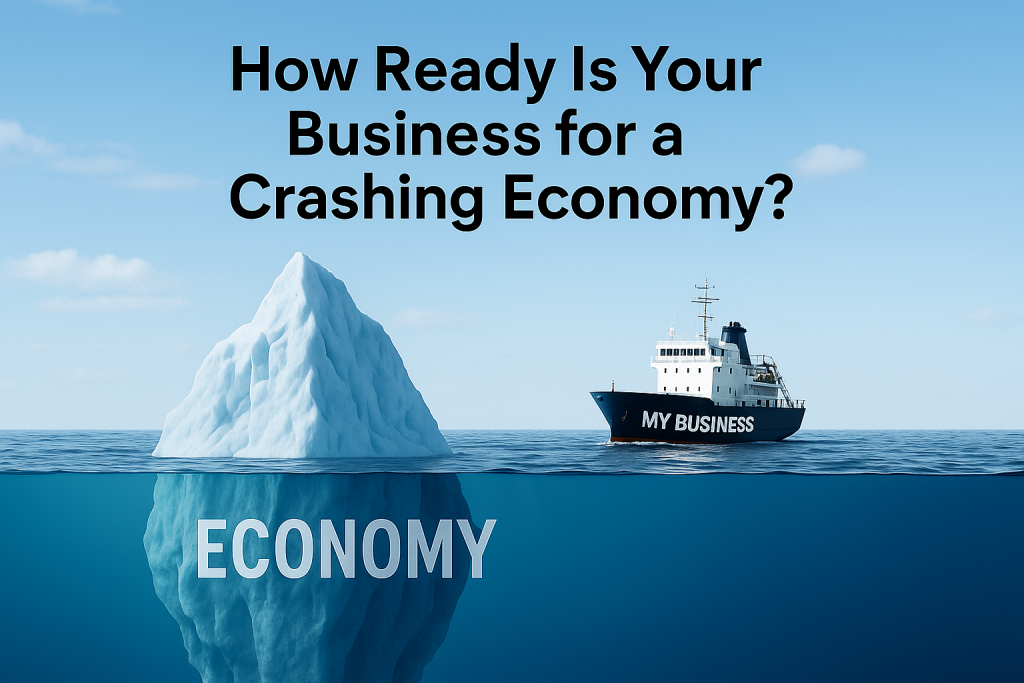Let’s face it business isn’t exactly predictable. One minute you’re cruising along, making good money like you’re printing the stuff, and then suddenly, BOOM! the economy turns, competitors get fierce and AI effects hit, and those cracks you didn’t know about or ignored start looking like giant wall cracks.
I’m no economist, but I don’t have to be a economic weatherman to tell you I see storm clouds and the wind blowing heavily.
Recently, I was chatting with the Managing Director of a medium sized business owner who confidently told me, “We’re all good, our sales are strong.” But when I asked about their readiness for an economic recession or unexpected competitive pressures, the answer..….crickets!
I was asking her where the economic cyclone (hurricane) bunker was, and she didn’t even know if she had one.
Here’s the worrying truth: Most businesses genuinely have no clue how resilient their sales engine actually is. It’s easy to feel strong and relaxed in calm waters, but when a storm hits, weaknesses get exposed very quickly and panic is not what you want.
I’ve seen it before. I watched business owners have their houses sold from beneath them during the 1990’s Global Financial Crisis.
In those days I was in my early days of a banking career. I saw firsthand the stress of business owners who just weren’t ready for an economic downturn. They blamed their banks, and their accountants. In some ways they may have had a point, yet it is like the captain of the Titanic blaming the scientist and ship builders for not warning about icebergs.
Twenty years as a Sales Engineer tells me one thing …. your Accountant and Banker don’t know enough about your sales engine.
In my time Sales Engineering and conducting regular Sales Resilience assessments, I’ve found that when economic pressures increase, cracks show up fast. They appear in unexpected places; sales processes, after-sales service, marketing, even in your leadership structure. And trust me, you’d rather find those cracks before someone yells “ICEBERG AHEAD!”.
Sales resilience isn’t just about surviving—it’s about being confident and in control during challenging times.
That means being proactive, assessing your processes, understanding your weak points, and engineering solutions that reinforce your sales engine.
In 2020 I worked with an engineering company who thought they had everything locked down tight. When things were going well, the owners ignored the idea of resilience checks. When Covid hit and sales dipped, their largest competitors got aggressive with pricing, and their sales started leaking faster than a submarine with a chimney. They scrambled to react—but reaction is rarely fast enough. They learned the tough way that readiness beats reaction every single time. And it’s a lot less stressful!
So, here are my tips:
Pressure-Test Your Revenue Generation
What happens if your biggest client disappeared tomorrow? Or if your top salesperson walked out?
Assess Sales Activity Distribution
Look at how much of the sales effort is carried by the top 20 percent. If it’s lopsided, you’re one resignation away from panic mode.
Audit Lead Source Diversity
Relying on one or two lead channels? That’s like putting all your chips on one number at the roulette table. Build sales diversity.
Evaluate Your Sales Process Under Stress
How well does your sales process hold up when deals slow down? Are steps skipped by your salespeople?
Review Sales and Marketing Alignment
If marketing is throwing leads over the wall and sales is ignoring them or mismanaging them, you’re leaking revenue. Resilience relies on tight integration.
Assess Leadership Grit and Adaptability
Are your sales leaders coaching through adversity or just managing targets and results like a broken record? Resilient teams need steady hands and strong leadership.
Measure Responsiveness to Market Changes
How quickly can your team adapt when buyer behaviour shifts or a competitor undercuts pricing? Urgent response = survival.
Monitor Forecast Accuracy regularly
If your forecast is consistently off, that’s not a forecasting issue—it’s a control issue. Resilience requires visibility you can trust.
Interrogate Your Sales Technology
If your CRM feels like a digital filing cabinet, you’ve got a BIG problem.
Check post-Sales Strength
Retention, upselling, and client feedback are part of your resilience equation. If sales focus ends at the sale, you’re not building strength—you’re burning opportunities.
Assess your resilience regularly.
Look proactively for cracks.
Strengthen your sales engine through intentional engineering.
Remember, resilience is your best defense and strongest competitive advantage. Don’t wait for your competitors or the economy to find your weak spots first.

